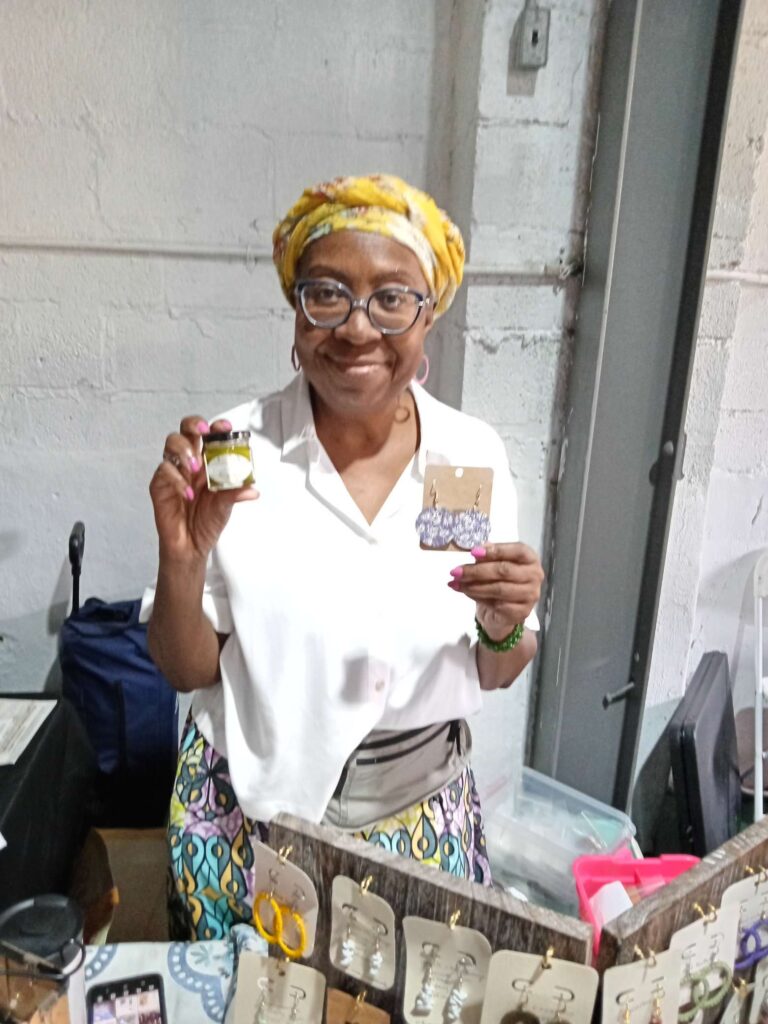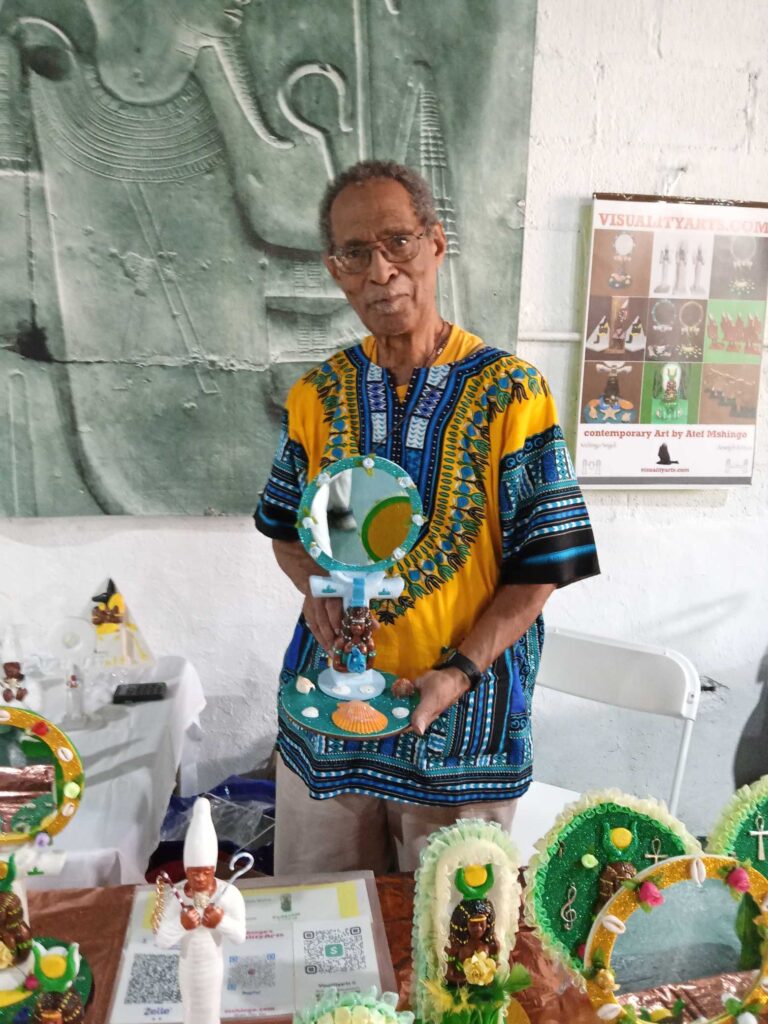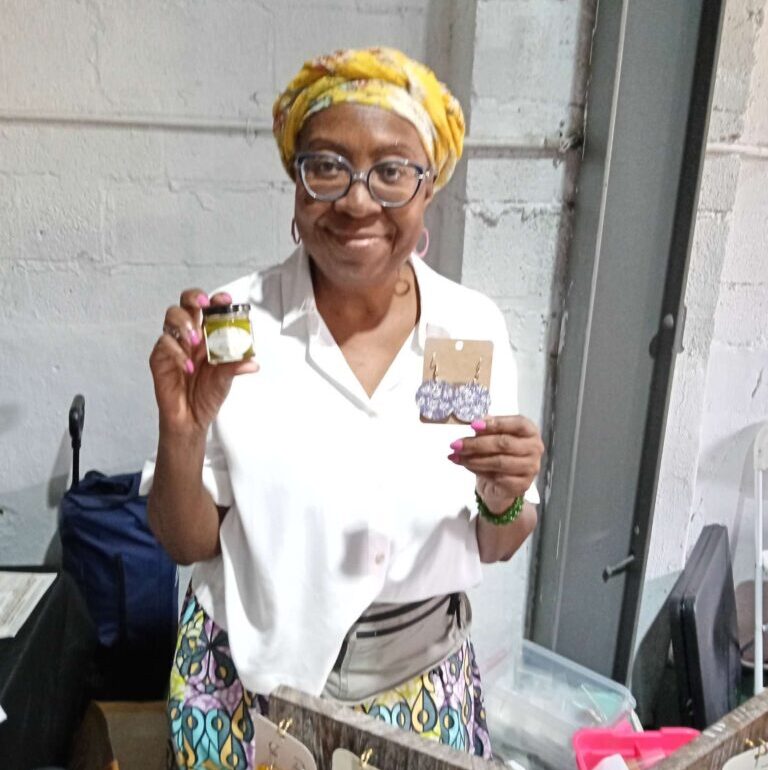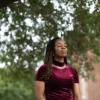A conference guest shops for a Het Heru dress at the health conference.” Photo: Constance Garcia-Barrio
By Constance Garcia-Barrio
The Black Women’s Health Conference sponsored by the Ausar Auset Society, a pan-African spiritual organization, occurred on August 31 and September 1 at the Nile Café complex in Germantown.
“This conference sounds the alarm bell on Black people’s health,” said Am Tehuti Khamau, chief priest of the Ausar Auset Society’s Pennsylvania, Delaware, and South Jersey region.
In 1973, the Ausar Auset Society was founded to provide Afrocentric spiritual training to the African American community and diaspora. The organization has members in 37 U.S. cities and other countries.
“The stress of being Black in America takes a toll,” Khamau said. “We’re at zero population growth.”
The conference aimed to nourish the whole woman and provide tools for critical self-care, Khamau said.
The gathering’s location at the Nile Café, Philadelphia’s oldest vegan eatery, which features scrumptious vegan versions of traditional soul food, emphasized the importance of a plant-based diet.
“I’m a science teacher, and I know that the body does better with a vegan diet,” said Samher, a member of Ausar Auset.
Conferees browsed the African market in the Nile’s spacious patio and the hall — which can be rented — where the workshops were held.

Catherine Carter, a homeopath with years of experience, holds a jar of jewelweed salve and handmade earrings. Photo: Constance Garcia-Barrio
Stephanie Owens, author of the “Aniyah” series, whose protagonist is a pretty, school-age Black girl, had a table.
“I want to provide an alternative to violent video games that reward children for killing,” Owens, the mother of several children, said.
The market danced with shimmering jewelry and dresses with African-inspired prints and vibrant colors, including the yellow and green of Het Heru, the gorgeous nurturing Egyptian goddess of love, joy, and birth.
Many items for sale complemented the workshops and gave guests a gentle way to begin self-care. Shekhemt (chief priestess) Satskamit Hefen was selling spiritual baths.
“We have been making spiritual baths for about 40 years,” Satskamit Hefen said, holding up a bottle of one labeled “Banishing,” a bath formulated to clear away negative energies. “We use herbs from farms, botanicals, and personal gardens. The baths are designed to assist in mediation.”
Homeopath and artist Catherine Carter’s table had a rainbow of handmade paper jewelry and natural remedies.
“Jewelweed is indigenous to the Northeast [U.S.],” she says, picking up a small jar of green salve made with the plant. “It’s used to soothe bug bites and eczema,” she said of the plant, which is also said to be antifungal, antibacterial, and a natural remedy for poison ivy rashes.
Atef Mshingo was offering statuettes, mirrors, and other objects he hand-crafted.
“You see your face in the mirror surrounded by shells and other symbols of Het Heru while you meditate,” he said. “Meditation is a science. Super Bowl champion Patrick Mahones meditates on how he’ll win.”
Priestesses poured libation and offered prayers before the workshops, which covered topics centered on healthcare. AtangUah Phillips, MD, doctor of integrative medicine and certified acupuncturist, discussed peri- and post-menopausal health on Saturday, as well as how to have a healthy pregnancy and delivery on Sunday.
As we age, cardiovascular conditions, cancer, and diabetes can affect our health, Dr. Phillips said, adding that we can take steps to maintain good health. She recommends exercise, including strength training, several times a week. She says the Mediterranean diet — lots of fruits, vegetables, whole grains, nuts and seeds, olive oil instead of saturated fats, and limited meat and processed foods — also promotes heart health.
Beets in particular contain L-arginine, an amino acid that helps produce nitric oxide, which relaxes the inner muscles of the blood vessels, thus lowering blood pressure, Phillips said.
Phillips emphasizes yearly mammograms for women from ages 40 to 74 and colonoscopies at the recommended intervals.
She suggests close glucose monitoring for women who, although not diabetic, have risk factors for the illness, such as inactivity and obesity.
“Now you can monitor glucose levels with iPhones and inexpensive smartwatches,” she said.
Another speaker, Dr. Gail L. Jackson, who holds a master of science in Oriental Medicine and is a licensed acupuncturist, discussed how acupressure and massage literally put healing at our fingertips. Developed in Ancient China, acupressure involves applying pressure with a hand to certain points on the body. This technique can affect heart rate and blood pressure, reduce pain, and relieve anxiety and depression, Jackson said. She provided a hands-on demonstration, but one can see how to use acupressure on one’s own body on YouTube videos.
Jackson also demonstrated Emotional Freedom Tapping (EMT), which consists of using one’s fingertips to tap different points on the body. For example, tapping the crown of the heads helps dispel sleepiness, she said.
“It refreshes me and lets me finish a task,” Jackson said. YouTube also has step-by-step instructions on EMT.
Kanika Harris, Ph.D., MPH, executive director of the National Association to Advance Black Birth, discussed skyrocketing maternal and infant mortality among Black Americans. The U.S. outstrips other developed countries in the deaths of women during childbirth and the subsequent year and in infant deaths during birth and the first year of life. Those numbers include shocking percentages of Black women and babies.

Alef Mshingo displays a mirror he designed to aid in meditation. Photo: Constance Garcia-Barrio
Among other remedies, we must demand the care we need, she said.
“If Serena Williams hadn’t advocated for herself, she would be dead now,” Harris said. (Williams’s first C-section incision popped open due to a fit of coughing and led to an embolism.) “Most deaths are happening post-partum, within 43 days of giving birth, and involve cardiovascular issues.”
Harris noted that Black women and infants fare much better with Black healthcare practitioners. She also sees midwifery as a way to resolve the crisis and proposes training midwives at historically Black colleges and universities (HBCUs). Such programs are taking shape at Morgan and Morehouse, she added.
In addition, Harris said that the allostatic load, or build-up of wear and tear due to living in a racist society, affects child-bearing women as well as the wider Black population and that stress management techniques, including qigong and meditation, can help buffer us.
On Sunday, Francoise B. Comer, Ph.D., assistant professor of history, culture, and politics at St. Elizabeth University, Morristown, New Jersey, presented “Telling Our Stories: Activism for Black American Women’s Maternal Health.”
An upbeat session came with Nzinga Foluke-Henderson, Ph.D.’s session, “The Healing Power of Joy.”
Drums sounded and hips swayed during the crowning event — the Het Heru Dance — said to heal the female reproductive organs.
For details about upcoming programs and events, visit: bit.ly/healblackwomen.
In addition, stay tuned for Germantown’s VegFest in the spring of 2025, an event that will feature Black vendors.



